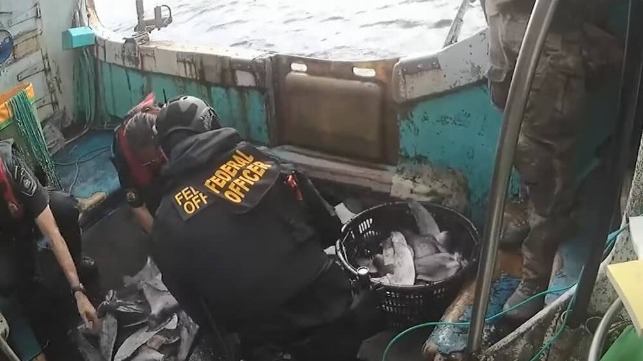Canadian Fishery Patrol Turns Up 3,000 Illegal Shark Fins

An annual mission to the North Pacific Ocean revealed the continuing menace of illegal, unregulated, and unreported (IUU) fishing through the discovery of 3,000 illegal shark fins and widespread fishery violations.
For two months, the multinational mission known as Operation North Pacific Guard patrolled over 12,000 nautical miles aboard the chartered vessel Atlantic Condor. The goal was to find illegal high seas driftnets, illegal fishing activity and inspect fishing vessels to ensure compliance with fisheries regulations.
The mission was led by Canada and involved ocean patrols, satellite and air surveillance. It interacted with over 400 crew members from different nations onboard their vessels. During the inspections, boarding parties found a total of 3,000 shark fins, an indication that illegal shark finning continues unabated. Some of the fins were from threatened species, such as oceanic whitetip sharks.
The team also inspected over 400 fishing vessels to confirm compliance with the conservation measures in place throughout the North Pacific. 58 violations were detected with Canada stating that it is working with the appropriate flag states to support further investigations and sanction the offending vessels. Also documented were incidents of marine pollution and many other violations.
During the mission, Canadian fishery officers supported by personnel from the Canadian Coast Guard, officers from the United States Coast Guard and the National Oceanic and Atmospheric Administration also collected environmental data and water samples to improve the understanding of the high seas environment, including the migration range of species of interest, such as Pacific salmon.
The Pacific Salmon Strategy Initiative (PSSI), which aims to enhance conservation, protection and enforcement efforts in high-risk areas for Canada’s Pacific salmon stocks, financed the patrol. As part of the PSSI, Fisheries and Oceans Canada (DFO) has committed more than US$35 million over the next five years to combat IUU fishing in the North Pacific, including the deployment of a high-seas patrol vessel in the region.
“I am proud of the leading role Canada plays in protecting fish stocks threatened by IUU fishing, and in combating marine ecosystem destruction. This helps protect the livelihood of our harvesters and maintains sustainable fisheries around the globe,” said Diane Lebouthillier, Minister of Fisheries, Oceans and the Canadian Coast Guard.

that matters most
Get the latest maritime news delivered to your inbox daily.
IUU fishing continues to be a thriving trade whose adverse impacts are declining fish stocks and the destruction of marine ecosystems globally. The trade is estimated to account for roughly 30 percent of all fishing activity globally, amounting to as much as 26 million tonnes of fish and costing the global economy over US$18 billion annually.
The annual mission, which in the past years has been led by the U.S, has been instrumental in enforcing the United Nations Ban on High Seas Driftnets and ensuring compliance with regulations that protect against IUU fishing.
